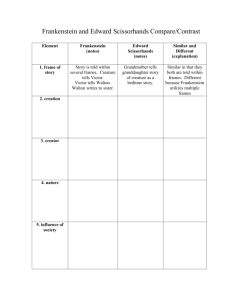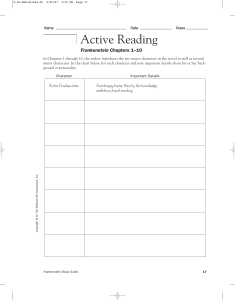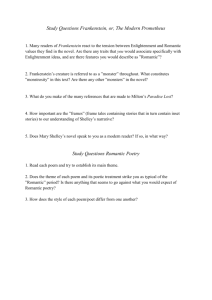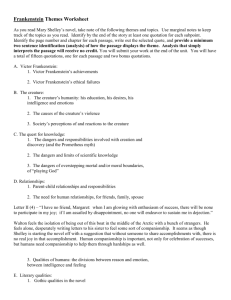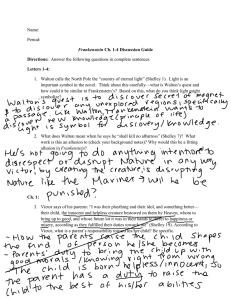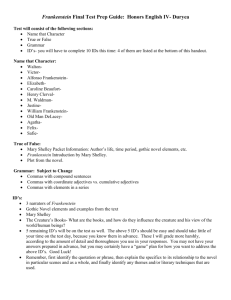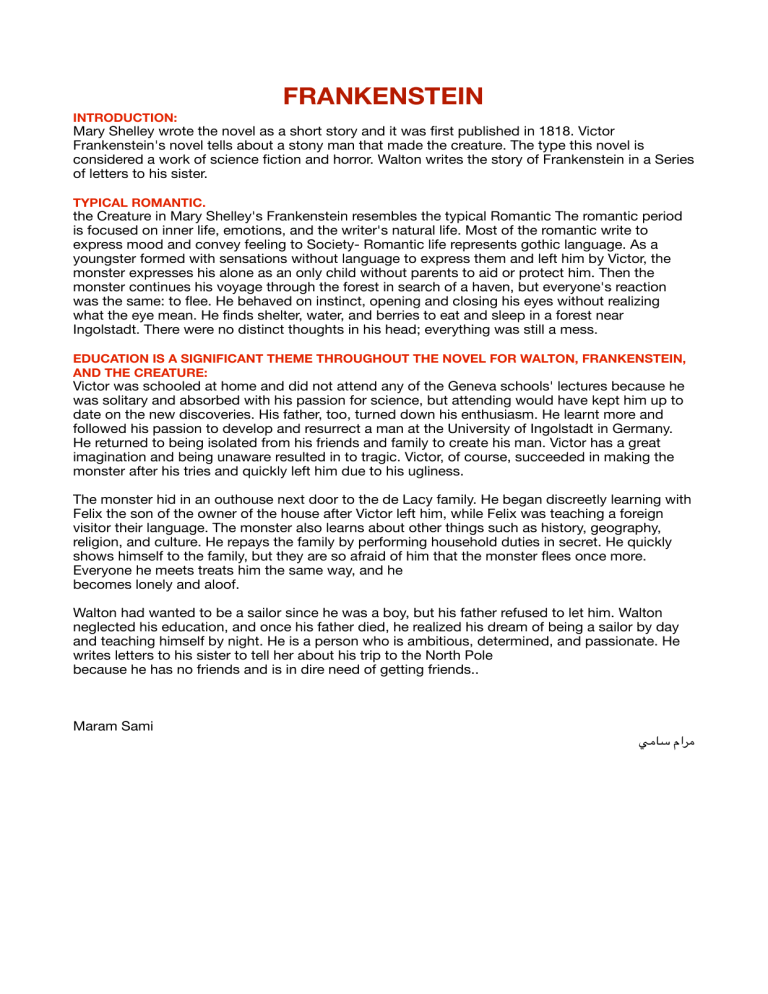
FRANKENSTEIN INTRODUCTION: Mary Shelley wrote the novel as a short story and it was rst published in 1818. Victor Frankenstein's novel tells about a stony man that made the creature. The type this novel is considered a work of science ction and horror. Walton writes the story of Frankenstein in a Series of letters to his sister. TYPICAL ROMANTIC. the Creature in Mary Shelley's Frankenstein resembles the typical Romantic The romantic period is focused on inner life, emotions, and the writer's natural life. Most of the romantic write to express mood and convey feeling to Society- Romantic life represents gothic language. As a youngster formed with sensations without language to express them and left him by Victor, the monster expresses his alone as an only child without parents to aid or protect him. Then the monster continues his voyage through the forest in search of a haven, but everyone's reaction was the same: to ee. He behaved on instinct, opening and closing his eyes without realizing what the eye mean. He nds shelter, water, and berries to eat and sleep in a forest near Ingolstadt. There were no distinct thoughts in his head; everything was still a mess. EDUCATION IS A SIGNIFICANT THEME THROUGHOUT THE NOVEL FOR WALTON, FRANKENSTEIN, AND THE CREATURE: Victor was schooled at home and did not attend any of the Geneva schools' lectures because he was solitary and absorbed with his passion for science, but attending would have kept him up to date on the new discoveries. His father, too, turned down his enthusiasm. He learnt more and followed his passion to develop and resurrect a man at the University of Ingolstadt in Germany. He returned to being isolated from his friends and family to create his man. Victor has a great imagination and being unaware resulted in to tragic. Victor, of course, succeeded in making the monster after his tries and quickly left him due to his ugliness. The monster hid in an outhouse next door to the de Lacy family. He began discreetly learning with Felix the son of the owner of the house after Victor left him, while Felix was teaching a foreign visitor their language. The monster also learns about other things such as history, geography, religion, and culture. He repays the family by performing household duties in secret. He quickly shows himself to the family, but they are so afraid of him that the monster ees once more. Everyone he meets treats him the same way, and he becomes lonely and aloof. Walton had wanted to be a sailor since he was a boy, but his father refused to let him. Walton neglected his education, and once his father died, he realized his dream of being a sailor by day and teaching himself by night. He is a person who is ambitious, determined, and passionate. He writes letters to his sister to tell her about his trip to the North Pole because he has no friends and is in dire need of getting friends.. Maram Sami fl fi fi fi fl مرام سامي Short essay (150 words) Mary Shelley's "Frankenstein" is a classic novel that explores the dangers of playing God and the consequences of unchecked ambition. The story follows Victor Frankenstein, a young scientist who becomes obsessed with creating life from dead body parts. He succeeds in his experiment but is horri ed by the monster he has created. The novel raises important questions about the nature of humanity and our responsibility towards our creations. Victor's rejection of his creation leads to a tragic chain of events that ultimately destroys both him and his monster. Shelley's use of Gothic elements such as dark settings, supernatural occurrences, and grotesque imagery adds to the eerie atmosphere of the novel. The themes explored in "Frankenstein" continue to resonate with readers today, as we grapple with issues surrounding arti cial intelligence and genetic engineering. Overall, "Frankenstein" is a timeless masterpiece that warns us against the dangers of unchecked ambition and reminds us to consider the consequences of our actions. Short essay (150 words) Education is a signi cant theme throughout Mary Shelley's novel Frankenstein, as it plays a crucial role in the development of the characters, Walton, Frankenstein, and the Creature. The novel explores how education can shape one's personality and in uence their actions. Walton's desire for knowledge and exploration leads him on a dangerous journey to the North Pole. His pursuit of scienti c discovery ultimately results in his realization that there are limits to human ambition and knowledge. Frankenstein's obsession with creating life is fueled by his education in natural philosophy. However, his lack of moral education leads him to abandon his creation, which ultimately leads to tragic consequences. The Creature's lack of formal education results in his initial innocence but also leaves him vulnerable to manipulation and mistreatment. He seeks knowledge through observation and reading but is ultimately rejected by society due to his appearance. Overall, Shelley uses education as a tool to explore the dangers of unchecked ambition and the importance of moral development. The novel highlights the need for a well-rounded education that includes both scienti c knowledge and ethical principles. Short essay (150 words) Mary Shelley's Frankenstein is a classic novel that embodies the Romantic era in literature. The creature, created by Victor Frankenstein, is a perfect example of the typical Romantic gure. The creature represents the Romantic ideals of individualism, emotion, and imagination. The creature is an outcast from society because of his appearance. He longs for acceptance and love but is rejected by everyone he encounters. This sense of isolation and loneliness re ects the Romantic emphasis on individualism and the rejection of societal norms. Furthermore, the creature's emotions are intense and raw. He experiences both joy and despair with equal intensity, re ecting the Romantic focus on emotion over reason. Finally, the creature's existence is a product of Victor Frankenstein's imagination. This highlights the importance of imagination in Romantic literature as a means to create new worlds or beings. In conclusion, Mary Shelley's Frankenstein embodies many characteristics of Romantic literature through its portrayal of the creature as an individualistic, emotional being created through imagination. fl fi fi fl fi fi fl fi fi Maram Sami

